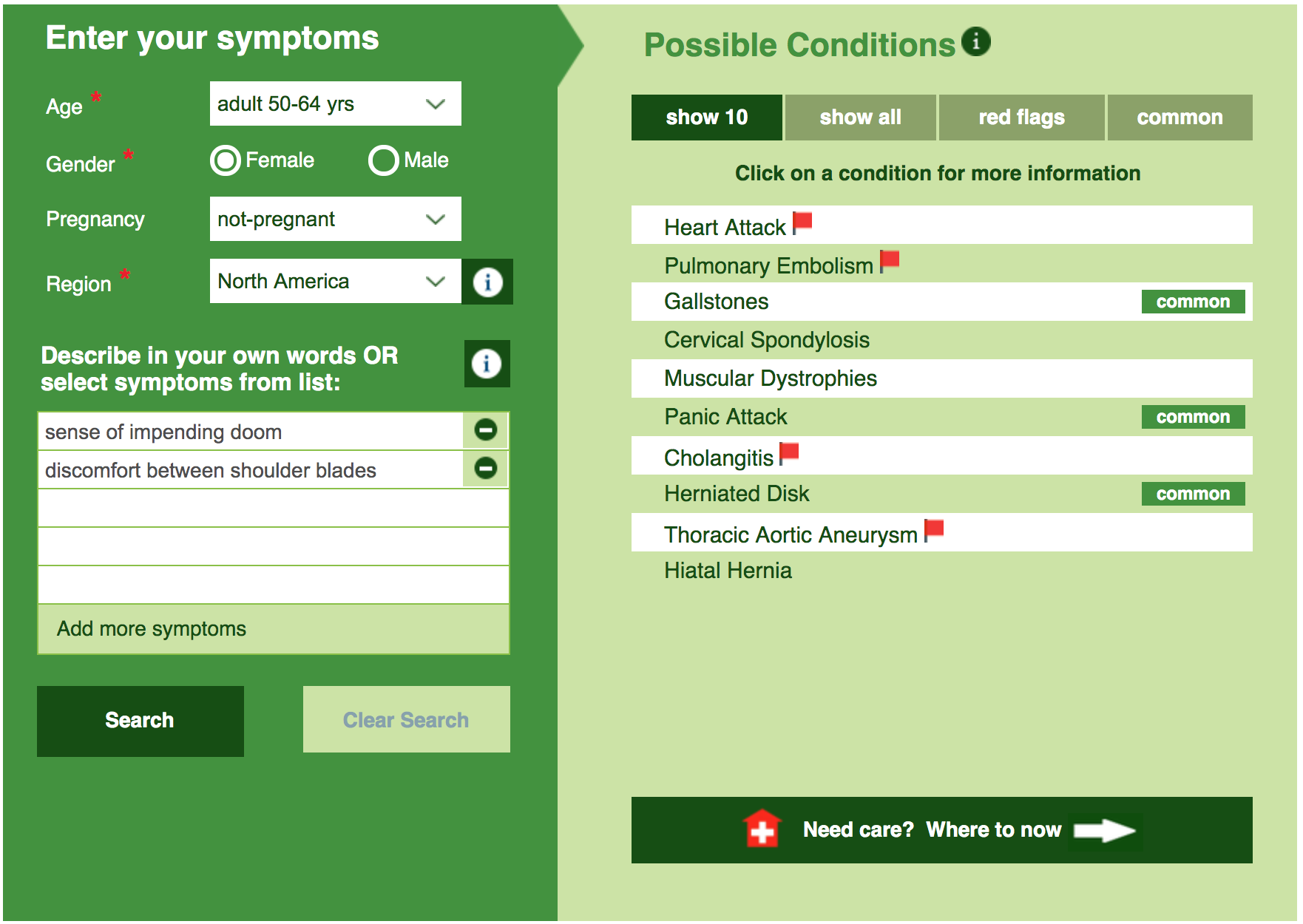- Privacy Policy
- Terms & Conditions
- Contact us
- ©Isabel Healthcare 2025
Are women's heart attacks less important than men's?
 Every year, twice as many women will die from a heart attack than from breast cancer, and yet to many it is still primarily considered to be a ‘man’s disease.’ As a result, women suffering from a heart attack are 59% more likely to be misdiagnosed compared to men. For most, crushing chest pain is the most common symptom of a heart attack but up to 38% of women don’t have this hallmark symptom, instead presenting with much more subtle symptoms which are often going unrecognised. The consequences of being sent away from hospital without a correct diagnosis of heart disease can more than double your risk of dying.
Every year, twice as many women will die from a heart attack than from breast cancer, and yet to many it is still primarily considered to be a ‘man’s disease.’ As a result, women suffering from a heart attack are 59% more likely to be misdiagnosed compared to men. For most, crushing chest pain is the most common symptom of a heart attack but up to 38% of women don’t have this hallmark symptom, instead presenting with much more subtle symptoms which are often going unrecognised. The consequences of being sent away from hospital without a correct diagnosis of heart disease can more than double your risk of dying.
Why women’s heart attacks are missed
The main reason for this anomaly is concerning. Mark Graber, Chief Medical Officer and Founder of the Society to Improve Diagnosis in Medicine (SIDM) explains: “The vast majority of studies in medicine were done on men and usually pretty healthy men….at medical school, we were taught that the classic symptoms of heart attack are X, Y and Z, but those are all studies done on men. You weren’t taught that there were different presentations for women.” What little research has been done on the subject reveals that women also experience other diseases differently, notably diabetes and strokes. And yet in spite of this, research on two thirds of diseases affecting both men and women concentrated their studies exclusively on men.
Heart attack symptoms in women
Our lack of awareness that heart attack symptoms can be quite different in women and men is putting lives at risk. And as women’s symptoms tend to be more subtle and less dramatic, they are reported less urgently, resulting in a potentially dangerously delayed diagnosis. Although men and women can experience the classic chest pressure, many women are more likely to experience some of the following symptoms instead:
- Discomfort in the neck, jaw, shoulder, upper back and abdomen
- Pain in one or both arms
- Dizziness or nausea
- Unexplained weakness or fatigue
- Discomfort or pain between the shoulder blades
- Sense of impending doom
- Sleep disturbances
These could be instead of, or as well as the symptoms more commonly associated with heart attacks, which include:
- Squeezing chest pain or pressure
- Shortness of breath
- Sweating
- Tightness in chest
- Feeling of heartburn or indigestion with or without nausea and vomiting
- Sudden dizziness or brief loss of consciousness

What puts women at risk of heart attacks?
Given that women’s symptoms can be more long-term and less dramatic, it is all the more important to not only recognise the symptoms mentioned above, but also bear in mind the many factors that put women at risk of heart disease and heart attacks. Although several traditional risk factors for coronary artery disease, such as high cholesterol, high blood pressure and obesity, affect women and men, other factors may play a bigger role in the development of heart disease in women. Key risk factors may include:
- Diabetes. Women with diabetes are at greater risk of heart disease than are men with diabetes
- Mental stress and depression. Women's hearts are affected by stress and depression more than men's
- Smoking. In women, smoking is a greater risk factor for heart disease in women than it is in men
- Inactivity
- Menopause. Low levels of estrogen after menopause pose a significant risk factor for developing cardiovascular disease in the smaller blood vessels
- Certain chemotherapy drugs and radiation therapy for cancer such as those used to treat breast cancer, may increase the risk of cardiovascular disease
- Pregnancy complications. High blood pressure or diabetes during pregnancy can increase women's long-term risk of heart disease
What to do if someone is having a heart attack
- Call your emergency number immediately
- Get them to chew an aspirin. Heart attacks are caused by blood clots in heart arteries and aspirin helps reduce these clots
- If the patient is not breathing, start CPR (Cardiopulmonary resuscitation) immediately and continue until emergency help has arrived and they can take over
- Get to the hospital quickly. The longer it takes to get treated, the more badly damaged the heart may be.
If you think you might be at risk of heart disease or are concerned about any symptoms you are experiencing, try entering them into the Isabel Symptom Checker an discuss the results with your doctor:
Subscribe Here!
Recent Posts
Isabel DDx Companion with ChatGPT Integration - to help you diagnose even faster
At Isabel Healthcare, we’ve always been driven by one goal: to make clinical reasoning faster,..Virtual Triage: Do more questions lead to better patient outcomes?
One of the common misconceptions related to virtual triage / symptom checker tools is that the more..List Of Categories
- Differential Diagnosis Decision Support
- Differential diagnosis
- Symptom Checker
- Symptoms
- Medical Error
- Patient Disease Information
- Disease
- Clinical Decision Support
- Diagnostic Decision Support
- Isabel 1 Minute Read
- Diagnosis Error
- Diagnosis Skills Cases
- Healthcare Informatics
- Clinical Reasoning
- Evidence-based Medicine
- Medical Education
- Patient Engagement
- Symptom Triage
- Nurse Practitioner Education
- Nursing Decision Support
- Partnership
- Public Health
- COVID-19
- EHR
- Patient Empowerment
- Patient Safety
- rare disease

Start your FREE Trial today
Try the Isabel Pro DDx generator for 30-days - no payment card details required.




